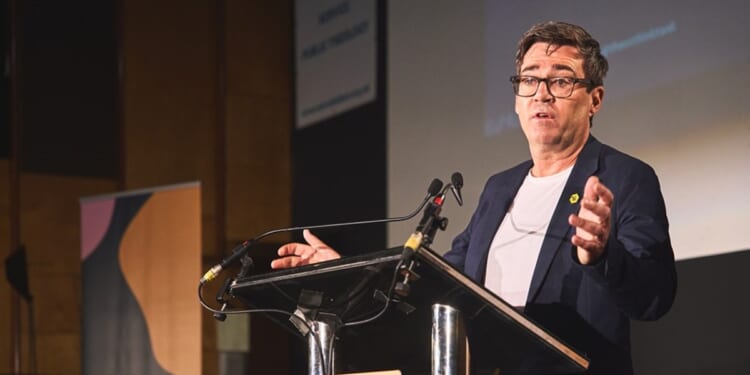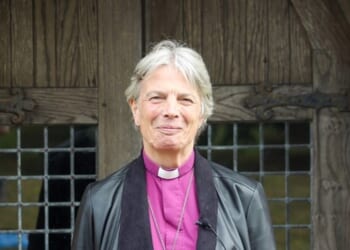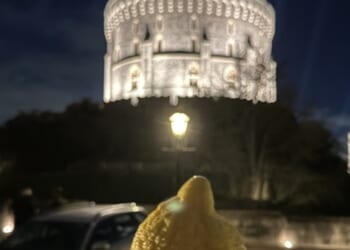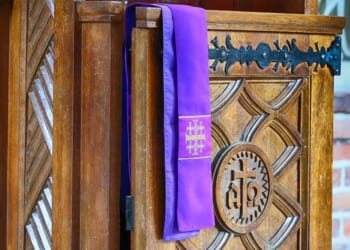FOR decades, political, economic, and perhaps even ecclesial power has drifted upwards and outwards. Global markets, national systems, and an online world make it possible to connect across continents; this means that, in many ways, the world feels smaller and more interconnected. But it does not seem to have led to greater trust — in fact, in many ways, it has led to the opposite. People’s hunger for belonging and agency is increasingly local rather than global. People are seeking local community.
Is this the direction of travel to achieve a more engaged society, or is this merely a nostalgic quest for something that the modern world has outgrown? For the Mayor of Greater Manchester, Andy Burnham, if we are to fix our broken systems and restore trust to our societies, we need to return to a politics that is rooted in place.
Delivering the Theos annual lecture on Thursday of last week, seven days after the attack on the Heaton Park Hebrew Congregation synagogue, Mr Burnham said that the current state of politics had failed communities. “Business as usual is finished now,” he said, addressing his former colleagues in Westminster. “You need to repair the damage in our communities. And you need to give devolution its chance to come up with a better way of running things.”
Trust levels are low among people in the UK. Recent data from the Office for National Statistics suggest that 68 per cent of people have little or no trust in political parties, and just under 60 per cent have little to no trust in the Government or Parliament. But distrust is not across the board: the majority (70 per cent) say that they trust most people.
Similarly, polling commissioned by Theos and conducted by YouGov before Mr Burnham’s lecture suggested that people were much more likely to put trust in people they knew. Some 84 per cent of respondents said that they trusted their friends and families, and 63 per cent trusted their neighbours.
FOR Mr Burnham, the disparity between trust in local institutions and trust in local people can be blamed on failure of the political system to move with the times. “The world has become more complex, but the way we run things has not,” he said. “In many ways, it is the same as it was in the last century, and this creates a disconnect between people and politics.”
For Mr Burnham, devolution is the answer; and it is clear why. When the Blair government introduced the idea of elected mayors and regional assemblies in the early 2000s, the debate was largely technocratic: it was about governance structures, efficiencies, and layers of bureaucracy. But, in Manchester over the past two decades, economic, cultural, and civic life has boomed.
What could not have been predicted but has become evident is the extent to which faith communities have quietly become indispensable partners in local life. Faith communities have been able to engage better, and have been included in conversations at local level, because, it seems, local authorities are less suspicious of them than they once were.
The Greater Manchester Combined Authority is one such example. Its ten-year strategy, published during the summer, recognises the voluntary, community, faith, and social-enterprise (VCFSE) sector as a crucial partner in the future of the city and region.
Under Mr Burnham’s leadership, Greater Manchester has worked intentionally with faith groups on homelessness, public health, and community cohesion. Faith leaders sit at the table; they talk fondly about how “Andy” has engaged them in shaping priorities.
There are local authorities in other places, however, that omit the “F” in VCFSE — not only dropping it from the acronym, but not paying attention to faith at all. In so doing, they fail to recognise the strength of faith communities’ work.
IF THE future is local, then the Church and other faith communities must continue to step into the spaces into which they are invited, drawing on a long history of being embedded. One potential opportunity, identified in a new report by researchers at Goldsmiths, University of London, and the University of Cambridge, is a rethink of the ways in which faith and belief are understood and mobilised in planning new towns and settlements, after the Government’s pledge to build 1.5 million new homes.
Faith communities are rooted in place, but are also connected to something beyond it. The reality, however, is that, while local authorities may be more open to partnership with faith communities and seeing their value, the public are less sure about — or, at least, less aware of — the contribution that faith groups make to their own town or city.
More than one third of the respondents to the Theos/YouGov survey said that faith communities had no real impact at all on the unemployed (35 per cent), or on local government (36 per cent) or regional government (38 per cent). Only eight per cent believed that faith groups made a negative contribution to their community; but 55 per cent said that they did not know what contribution faith groups made, or said that it was neither good nor bad.
This presents a problem for a Church that wants to be relevant, play a part in public life, and draw people towards the good news of Christ. The lack of awareness is also surprising, considering that faith groups have, in fact, increased their contribution to public life in ways that should not be ignored.
The financial crash of 2008 resulted in the proliferation of foodbanks, many of them church-based, thanks to the work of Trussell. The Covid-19 pandemic turned places of worship into vaccination centres, welfare hubs, and networks of neighbourly care. Today, in every large city in the UK, you will find faith groups not only preaching and praying, but running night shelters, mental-health support groups, youth clubs, environmental campaigns, and refugee-welcome projects.
Churches’ work extends beyond local welfare provision, however: they also play a vital part in responding to civil unrest and tragedies. In a recent report, Disunited Kingdom? Local churches and the riots of summer 2024, Theos’s senior researcher, Hannah Rich, illustrated the indispensable work of churches in the midst of social rupture. The report described how they leveraged their community networks, maintained a “trusted presence in the community”, and used their “convening power to draw the community together”.
FROM a Christian perspective, the idea of devolution comes close to the understanding of the incarnation: what was distant “becomes flesh and blood and moves into the neighbourhood” (John 1.14, MSG). God, just like the best of local faith groups, is embedded in community.
It is clear that Mr Burnham and other regional mayors believe that the future is in the local; but devolution is not without its risks. Shifting power closer to home does not automatically guarantee better outcomes. Nor does it remove the political and economic constraints within which local leaders operate. But it does create the possibility of governance that feels less distant, less abstract, and more human. And, in that space, faith has something distinctive to contribute. If the future is local, the future should be faith-filled.
Chine McDonald is director of Theos.

















